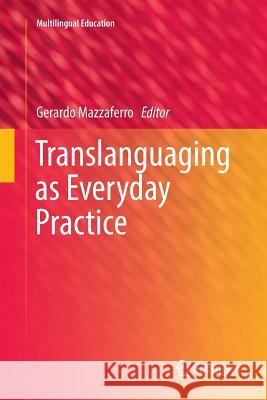Translanguaging as Everyday Practice » książka
topmenu
Translanguaging as Everyday Practice
ISBN-13: 9783030069254 / Angielski / Miękka / 2019 / 273 str.
Kategorie:
Kategorie BISAC:
Wydawca:
Springer
Seria wydawnicza:
Język:
Angielski
ISBN-13:
9783030069254
Rok wydania:
2019
Wydanie:
Softcover Repri
Numer serii:
000450976
Ilość stron:
273
Waga:
0.40 kg
Wymiary:
23.39 x 15.6 x 1.52
Oprawa:
Miękka
Wolumenów:
01
Dodatkowe informacje:
Wydanie ilustrowane











